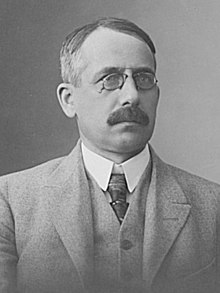Gustav Suits
Gustav Suits (born November 18 . Jul / the 30th November 1883 greg. In the municipality Kastre-Võnnu , parish Võnnu, Governorate of Livonia ; † 23. May 1956 in Stockholm , Sweden ) was an Estonian poet and literary scholar .
Early years
Gustav Suits was born in the rural Tartu district as the son of a school teacher. He first attended the village school, from 1895 the Aleksandri gümnaasium in Tartu . While still a schoolboy, he worked as a tutor for French and German in Finland during the summer months . He belonged to a journalistic group of students who were enthusiastic about literature. At the age of 16, Suits published his first essay in the newspaper Uus Aeg ("Neue Zeit") . In 1899 his first poem Vesiroosid ("The Water Lilies") appeared in a newspaper.
In 1904 Suits passed his Abitur with distinction ("gold medal") and began his studies at the University of Tartu . From 1905 to 1910 he studied literature , aesthetics and Finnish folk poetry at the University of Helsinki . From 1911 to 1913 was employed at the Helsinki University Library . From 1913 to 1917 he taught Finnish at the Russian high school in Helsinki.
From 1917 to 1919 Suits was heavily involved in left-wing politics, but strictly rejected communism with Soviet characteristics. He joined the Estonian Trudoviki and demanded Estonia's independence from Russia . After Estonia's state independence was declared in 1918, Suits returned to his homeland.
Literary man
From 1921 to 1944 Gustav Suits worked at the University of Tartu as a lecturer , later as a professor for Estonian and general literature . 1921/22 Suits was editor of the radical literary magazines Murrang and Tarapita . He then served on the editorial committee of the influential Looming magazine . During this time he published a large number of literary essays and writings. In 1924 he founded the Academic Literature Association ( Akadeemiline Kirjandusühing ), whose chairman he remained until 1,941th In 1935, Uppsala University made him an honorary doctorate .
In 1941, Suits's house burned down with numerous documents and unpublished manuscripts. Before the Soviet occupation of Estonia, Gustav Suits fled to Sweden via Finland in 1944 . In Stockholm he was employed in the library of the Nobel Institute of the Svenska Academies .
Gustav Suits died in 1956 after three years of serious illness. He is buried on Skogskyrkogården in Stockholm .
poetry
Gustav Suits was a renewer of Estonian-language poetry . From 1905 to 1916 he belonged to the literary movement Noor-Eesti ("Young Estonia") as one of its leading figures. The works of Noor-Eesti meant a stronger turn to Estonia towards European poetry, especially towards France and the Scandinavian countries . The guiding star for the group was Gustav Suits' appeal in Noor-Eesti's first album: "Let's be Estonians, but let's also become Europeans!" ( Olgem eestlased, aga saagem ka eurooplasteks! ).
In his poetry, Gustav Suits combines very personal experiences with general elements. The Estonian History plays a big role in his work, along with love poetry and erotic allusions. His poetry was young and optimistic at the beginning, but disappointed and militant tones have spread in Russia since the First World War and the October Revolution in 1917.
Most important works
- Elu tuli (poems, 1905)
- Sihid ja vaated (Essays, 1906)
- Tuulemaa (poems, 1913)
- Ohvrisuits (poems, 1920)
- Kõik on kokku unenägu (poems, 1922)
- Lapse sin (Ballad, 1922)
- Noor-Eesti nõlvakult (essays, 1931)
- Tuli ja tuul (poems, 1950)
Private life
Gustav Suits married his Finnish colleague Aino Thauvón (1884–1969) in 1911. The couple had two daughters.
literature
- Aino Thauvón-Suits. Gustav Suitsu noorus kirjade, luuletuste ja mälestuste põhjal. Lund 1964
- Cornelius Hasselblatt. History of Estonian Literature. Berlin, New York 2006. ISBN 3-11-018025-1 , pp. 364-368.
Web links
- Gustav Suits (Estonian Literary Magazine)
- Biography, pictures and texts ( Eesti värss )
- CV (Estonian)
- Literature by and about Gustav Suits in the bibliographic database WorldCat
Remarks
- ↑ In Estonia: Sotsialistide-Revolutionary Party or Партия социалистов-революционеров
- ↑ German: "Life is only a dream"; the title is borrowed from Pedro Calderón de la Barca's verse drama La vida es sueño (1634/35), as Suits himself explained.
| personal data | |
|---|---|
| SURNAME | Suits, Gustav |
| ALTERNATIVE NAMES | Wahur, Kustas (pseudonym) |
| BRIEF DESCRIPTION | Estonian lyric poet |
| DATE OF BIRTH | November 30, 1883 |
| PLACE OF BIRTH | Kastre-Võnnu Municipality, Võnnu Parish , Livonia Governorate |
| DATE OF DEATH | May 23, 1956 |
| Place of death | Stockholm |
